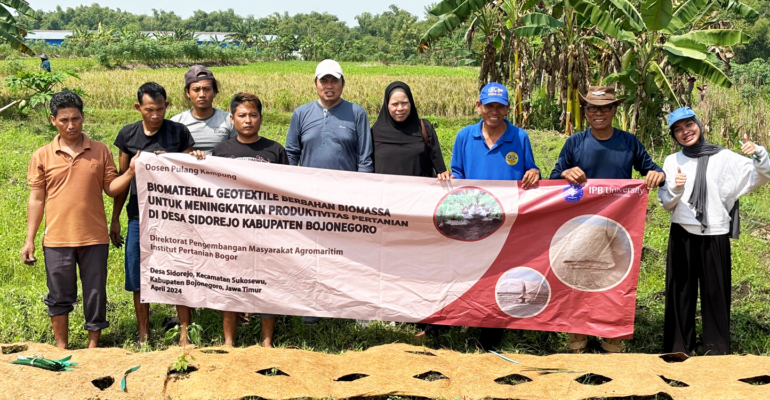IPB University Lecturer Improves Papaya and Chilli Quality with Coconut Coir Geotextile

IPB University’s 2024 Dosen Pulang Kampung (Dospulkam) activity returned to the community of Sidorejo Village, Bojonegoro Regency, East Java. The team of lecturers from the Department of Physics and the Palm Oil Study Centre of IPB University, led by Dr Siti Nikmatin, brought their innovation in the form of geotextiles as a substitute for plastic mulch applied in papaya and chilli cultivation.
The team consisting of Prof Budi Mulyanto, Rima Adiati, M.T., and Abd Djamil Husin, M.Si. brought a geotextile innovation made from natural village waste such as straw and coconut fibre. Geotextile innovations are made from non-woven fibres, with milling and fibrillation techniques followed by casting in random orientation.
“The purpose of mulching is to protect fruit and vegetable crops from weeds and maintain soil stabilisation so that agricultural productivity increases. Currently, farmer groups use black plastic mulch for agriculture,” said Dr Siti.
She explained that the use of plastic mulch incurs additional costs and plastic waste after use. Innovation in utilising coconut fibre and straw waste in geotextile applications can provide a solution to these problems.
“The use of geotextiles as a mulch substitute proved effective after one month of observation. Plants grow well, are not disturbed by weeds and soil moisture is more stable. Observations will continue until harvest time and will be compared between crop yields in gardens that use plastic mulch and those that use geotextiles,” said Dr Siti.
“The Dospulkam programme brings appropriate technology that can turn agricultural waste into more valuable,” added Djamil, a member of the Dospulkam team.
This programme was welcomed by the Sidorejo Village farmer group, “We are grateful to IPB University, especially the Dospulkam team, for this applied material science that can bring benefits to biomass-based sustainable fruit and vegetable farming,” said the farmer group representative.
Through the Dospulkam programme, simple technology transfer was provided through training and demonstration in waste sorting (straw, husk, coconut husk), geotextile making. The training was attended by 20 farmers who are members of the “Karya Tani” farmer group. (rfa/Lp) (IAAS/RUM)


